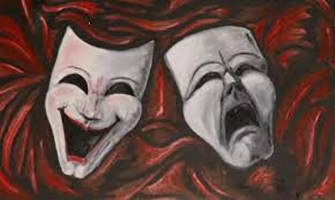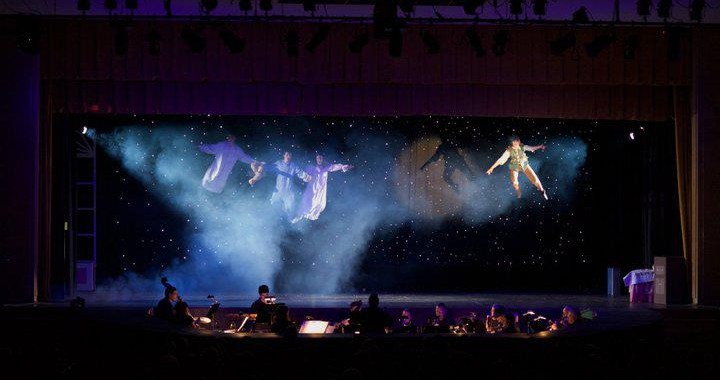Reprinted from elitedaily.com, written by De Elizabeth. Original article here.
As a former theatre kid, you probably got an awful lot of sh*t. It’s likely that you were reputed to be loud, over-dramatic and known to do “odd” things, like burst into song at any given moment.
However, as you and all theatre kids know, many of your valuable life lessons have derived from days spent in rehearsals or at performances.
You can credit a wide range of skills used in your daily adult life to what you learned as a teenager, when you were known as the “weird theatre kid.”
As a young adult, you can look back on your days in high school drama club with both nostalgia and gratitude.
Not only were those long evening rehearsals an absolute blast because you were with your friends, laughing at inside jokes and having sing-alongs to the “Wicked” original recording, but because being part of a production helped you grow immensely.
So, let’s take a moment to pause in our busy adult lives to remember what it felt like to be 16 and putting on our first pair of character shoes.
Here are 10 ways theatre class creates some pretty awesome adults:
1. You learned the harsh taste of rejection early… and how to cope.
Every theatre kid knows that one-two punch of waiting… and waiting… and waiting for the cast list, only to be met with sheer disappointment.
It feels like being pushed off a cliff; your heart races as you scan the names, wondering why you don’t see your own. You look twice, and even a third time and then, it finally settles in. You didn’t make it.
The first time this happened to you, it was devastating. You wondered what you did wrong; you felt worthless. You may have cried for an hour or more.
You kept auditioning though, and you kept trying. Truth be told, rejection sucked every time, but it somehow got easier. You learned that it wasn’t personal, that maybe you just weren’t the right fit.
You learned to ask your director questions instead of bottling up your feelings. You focused on what you could do better next time.
This way of thinking stuck with you as you grew up. Sometimes, it’s just not the right role, job or boyfriend, but it doesn’t mean you suck as a person. You’ve developed a thicker skin and you’re tougher than many of your peers.
2. You know that success doesn’t come without hard work.
Any time you landed a juicy role in a show, you had to work your butt off for it. You never rolled into an audition without adequate preparation; you made sure you knew your song or monologue cold.
Additionally, you know how much time goes into creating a successful production. It takes hours of rehearsals and dress rehearsals, countless weekend set builds, tech days to program the lighting, costume fittings, and the list goes on and on.
You didn’t get to collect your bouquet of flowers until you contributed the necessary blood, sweat and tears.
This philosophy doesn’t end with the theatre — it extends into all areas of your life. Accomplishments do not exist without great effort.
3. “Getting into character” taught you empathy.
If there’s any person who understands the meaning behind the phrase “put yourself in her shoes,” it’s you. This is literally what you had to do every time you approach a new role.
Your acting exercises include instructions to connect moments in your own life to that of your character. You had to look for similar emotions within your own heart.
This wasn’t always easy, especially if you were playing a character unlike whom you actually are. Sometimes you felt disconnected from a role, and you had to look inward in order to grasp it.
This skill has been essential to you; it’s helped you understand the world around you. You can relate to others, and you’re able to interpret their behaviors, even if you don’t agree with them.
4. Spontaneity is in your blood.
Before “YOLO” was a thing, there was the Broadway show “Rent,” which taught all former theatre kids this important lesson: “No day but today.”
To say you embraced this to the fullest is an understatement. You’re fun to be around because you adore spontaneity. You’re the type of person who will shout “road trip!” and you get excited about making adventure of everyday activities.
You have an appreciation for living in the moment because you know how much each moment counts. A moment can make or break your audition, and a moment can make an audience member laugh or cry.
You strive to make the most out of every second of every day, and you look for ways to create excitement.
5. You are a kickass problem-solver.
In live theatre, things are bound to go wrong at some point. Maybe you had to step in and take the place of a fellow actress who was sick, or perhaps, you lost a prop mid-show and had to figure out how to deal.
If you worked backstage, your problem-solving skills might even be sharper. You had to prepare to help yourself and the actors if need be.
When something goes wrong during a performance, there is zero time for panic. All you can do is launch into damage-control mode and focus on the solution at hand.
You know how to keep your cool during a crisis, and you know that the goal is to solve the problem. The best thing you can do is work toward that goal, without melting down.
6. Thinking on your feet is your specialty.
You’re probably cringing as you remember a time when your scene partner forgot all of his lines and you had to improvise your way through it.
You were sweating underneath your costume and trying to summon every ounce of possible psychic willpower to telepathically send him his lines. When you exited the stage, your friends surrounded you and praised your improvisational skills.
Or perhaps, your scene partner forgot an entrance, leaving you alone onstage with an entire audience staring at you.
Sometimes, things go wrong and there’s absolutely no time to plan a solution. When that happens, you have to have cat-like reflexes and be fast on your toes.
Luckily, you learned this (perhaps the hard way) during those terrifying theatrical moments and you now have the strengths to handle unexpected obstacles.
7. You’re well-spoken.
“The lips, the teeth, the tip-of-the-tongue!”
All of those drills you did as vocal warm-ups probably haven’t left your brain, even after a decade.
You know how to project your voice, how to use correct diction and enunciation, and how to craft the sound of your voice in order to be understood.
Thanks to all the speech exercises — not to mention that time you did Shakespeare —, you are quite skilled at speaking eloquently.
This comes in handy when you go on job interviews or when you have to give presentations at work. You’ll find yourself channeling those tools from class, and you’ll feel grateful when you’re respected by those you’re speaking to.
8. You’re a go-getter.
In theatre, you don’t get what you want without putting yourself out there first. In order to be cast in a show, you have to audition. In order to be on the production team, you have to interview. End of story.
Building confidence is key; you had to give yourself many pep talks before you ventured out to your first audition and to many auditions after that.
It takes a lot of effort and self-esteem to push apprehension aside and go for it anyway.
You know that life demands similar qualities out of you and that no reward comes without some element of risk.
9. Fear doesn’t get the best of you.
You remember your first few auditions in high school and the feeling of getting onstage in front of your teachers (and sometimes peers). Your palms were probably sweaty, and maybe, your knees shook a little.
It’s possible this happened every time you auditioned; many professional performers confirm that stage fright never entirely disappears.
Despite the fact that you were scared, you learned how to control your nerves. You learned how to seize that nervous energy and trap the butterflies that ran rampant in your stomach.
That sense of control allowed you to channel that energy into whatever you wanted it to be, and you put it toward a successful performance.
As you navigate your 20s, you know that you’ll find yourself in many situations that create anxiety and nerves. However, you won’t run from those scenarios; instead, you’ll face them head on with deep breaths and confidence.
10. Your friendships run deep
Perhaps most importantly, being in theatre gave you several dozen families over the years. Every show became its own chapter in this larger story of your theatrical endeavors.
With each cast, you bonded in a different way, some more closely than others.
You’ve been lucky to have shared the stage with some of these people and even luckier to have them in your life now.
You care a lot about your friends, and the bonds that you’ve created will forever remain unbroken, even after your final curtain call.

